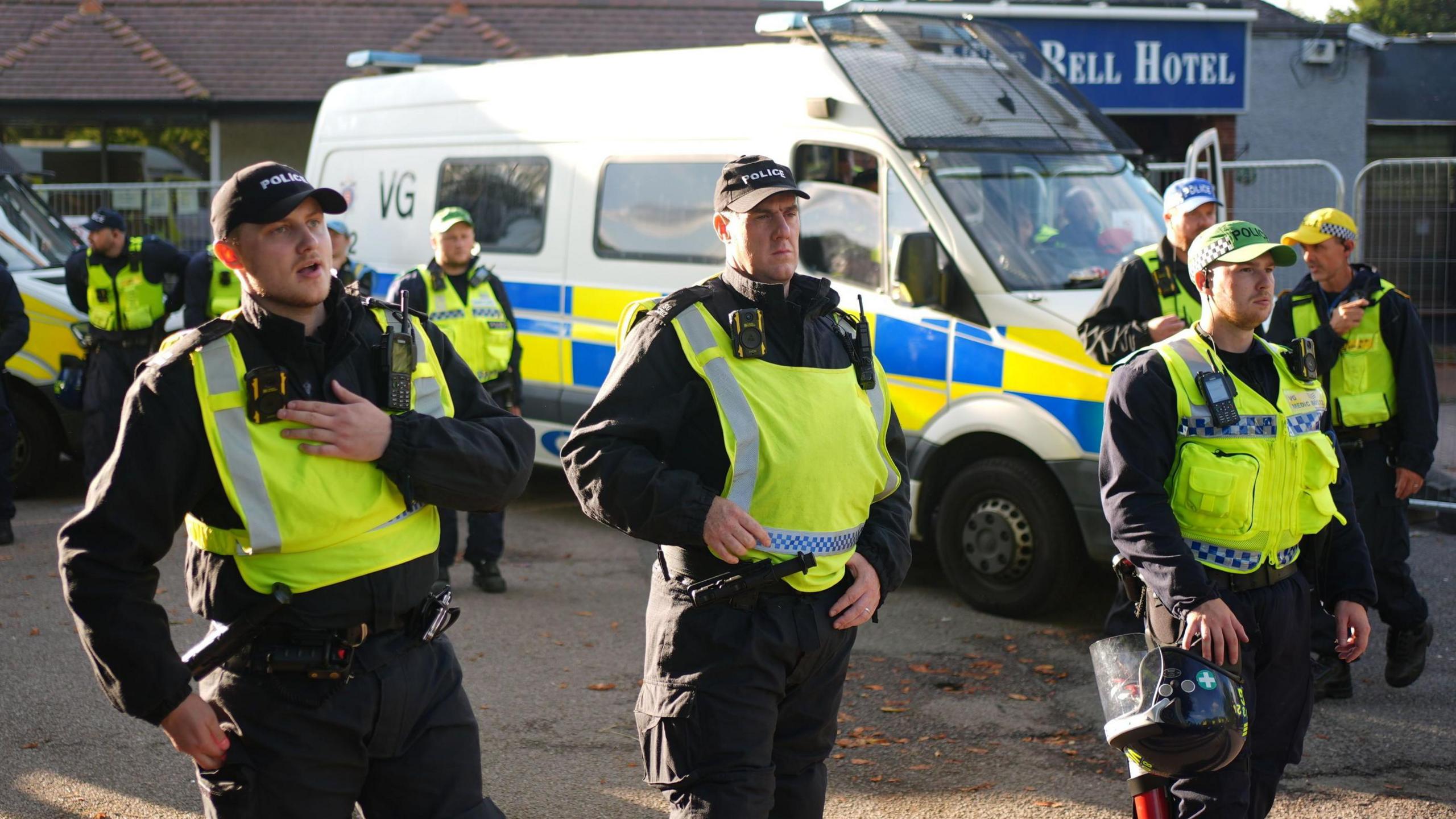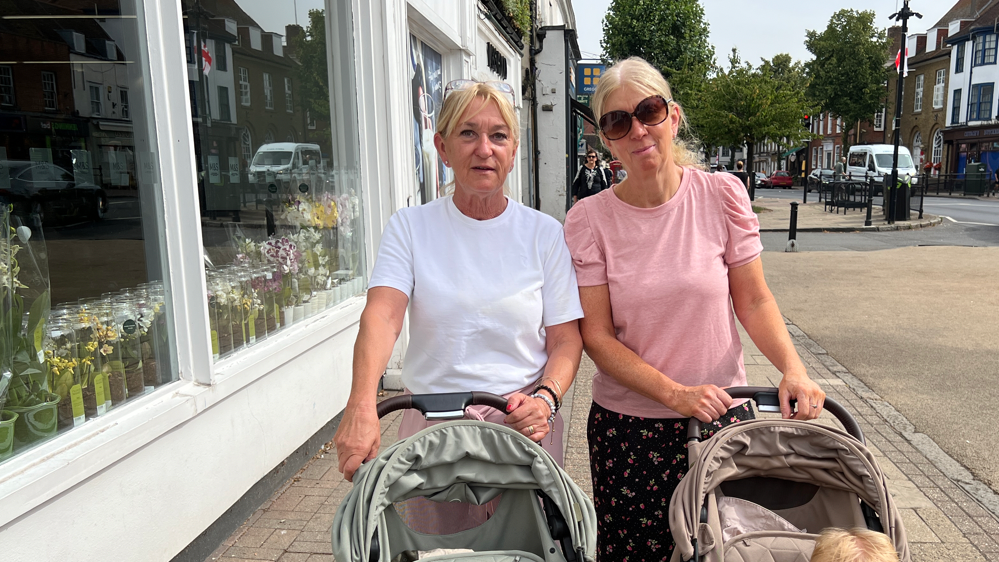More asylum hotels face legal challenge after court ruling

- Published
Councils across England are poised to take legal action to remove asylum seekers from hotels in their areas.
It follows the High Court granting a district council a temporary injunction to block asylum seekers from lodging at The Bell Hotel in Epping, Essex.
All 12 councils controlled by Reform UK will "do everything in their power to follow Epping's lead", the party's leader Nigel Farage said. A Conservative-run council in Broxbourne, Hertfordshire, also said it is considering taking similar action.
Border Security Minister Dame Angela Eagle said the government will "continue working with local authorities and communities to address legitimate concerns".
Practical and political pain for Home Office after hotel ruling
- Published19 August
UK signs deal with Iraq to speed up migrant returns
- Published20 August
Council 'has money' to fight asylum hotel appeal
- Published20 August
Writing in the Telegraph, external, Farage urged people "concerned about the threat posed by young undocumented males living in local hotels" to "follow the example of the town in Essex" in peaceful protest.
The judge in the case ruled in favour of Epping Forest District Council after it argued that the hotel had become a public safety risk because of its alleged planning law breach by ceasing to be a true hotel.
The case returns in October, when a judge will have to decide whether The Bell Hotel has unlawfully changed how it is being used.
Dan Jarvis, Minister of State for Security, told the BBC the government had "never thought that hotels were an appropriate source of accommodation for asylum seekers."
When asked where the asylum seekers at The Bell Hotel would be moved to, he told BBC Radio 4's Today programme the government was "looking at options" to rehouse them in "suitably appropriate alternative accommodation."
He said it was up to local councils to decide on whether to pursue similar legal action, but stressed that there were "quite specific circumstances" in the Epping case.
"The basis of the legal case was around a planning matter," he added.
The case brought by Epping Forest was that the alleged planning breach had led to evidenced harms. Critically, these harms related to protests which had led to violence and arrests.
For other councils to follow suit they would have to show the High Court evidence of local harm.
'Set a precedent'
Tory-run Broxbourne Council was the first local authority to declare it was seeking legal advice after the ruling "as a matter of urgency about whether it could take a similar action" over a hotel in Cheshunt.
Council leader Corina Gander told the BBC that Epping Forest District Council had "set a precedent".
"The government has failed, and now local councils are standing up," she said. "Enough is enough now."
Meanwhile, the leader of South Norfolk District Council, also run by the Conservatives, said the council will not go down the same route over a hotel housing asylum seekers in Diss which has been the subject of protest.
Daniel Elmer said the authority was using planning rules to ensure it was families being housed in the area rather than single adult males.
Government ministers say they are braced for other councils to follow Epping's lead.
The ruling causes immediate practical difficulties for the Home Office, which has less than a month to find alternative accommodation for the asylum seekers currently housed at the Bell Hotel.
Home Office lawyers have acknowledged that the ruling could "substantially impact" the government's ability to house the 32,000 asylum seekers living in 210 hotels across the UK if other councils pursue similar action to Epping Forest District Council.
They also warned that granting Epping Forest an interim injunction "runs the risk of acting as an impetus for further violent protests round other asylum accommodation."
The government has pledged to no longer use hotels by the end of this parliament, but some contracts are in place until 2029, and pressure could grow on ministers to find alternative accommodation at a greater pace than envisaged.
Dame Angela added: "Our work continues to close all asylum hotels by the end of this Parliament."
The Home Office has also suggested The Bell Hotel injunction "runs the risk of acting as an impetus for further violent protests".
Shadow home secretary Chris Philp said that people should be "removed upon arrival" and sent either to "their country of origin or a safe third country like Rwanda."
If this happened then, he said, "the problem of accommodating people who have crossed the channel illegally, almost all of whom are young men, wouldn't arrive in the first place."
Court rules asylum seekers must be moved from hotel
- Published19 August
UK's asylum hotel bill down 30%, government says
- Published18 July
What do people in Epping think of the town's migrant hotel?
- Published16 August
Epping saw thousands of people protest outside the hotel after an asylum seeker living there was charged with sexually assaulting a 14-year-old girl.
Hadush Kebatu, 41, denies the charges against him, while a second man who resides at the hotel, 32-year-old Syrian national Mohammed Sharwarq has been charged with two counts of common assault and four of assault by beating - concerning four complainants.
Essex Police said the protests, which were also attended by those in support of asylum seekers, became violent on occasion. Sixteen people have been charged with offences relating to disturbances during the demonstrations.
Conservative-run Epping Forest District Council was granted an injunction to block migrants staying at the hotel after an eleventh-hour effort from Home Secretary Yvette Cooper to have the council's case dismissed was ignored.
The district council's leader Chris Whitbread called the injunction "great news" but asked residents not to protest or "over-celebrate", having previously said the protests risked causing "irreparable harm."
"This is the beginning. It is not the end," he added in response to the ruling.
Similar cases in recent years have seen judges refuse to intervene but Epping Forest told the court its case was different as the hotel had become a safety risk, as well as a breach of planning law.
During the case, the government's lawyer said any injunction granted could act as "an impetus for further violent protests" and could "substantially interfere" with the statutory duty of the Home Office to avoid a breach of the asylum seekers' human rights.
Asylum seekers staying at the hotel must move out of The Bell Hotel by 16:00 BST on 12 September, the judge ruled.
Enver Solomon, chief executive of the Refugee Council, said "everyone agrees hotels are the wrong answer" as they "cost the taxpayer billions, trap people in limbo and are flashpoints in communities."
He added: "We see how protests and hostility leave people who have fled war and persecution feeling terrified and targeted in the very places they are forced to live.
"This makes an already traumatising situation worse and prevents people from feeling safe."
Get in touch
How have you been personally affected by the issues raised in this story? Get in touch.
Related topics
- Published19 August

- Published9 August

- Published16 August
